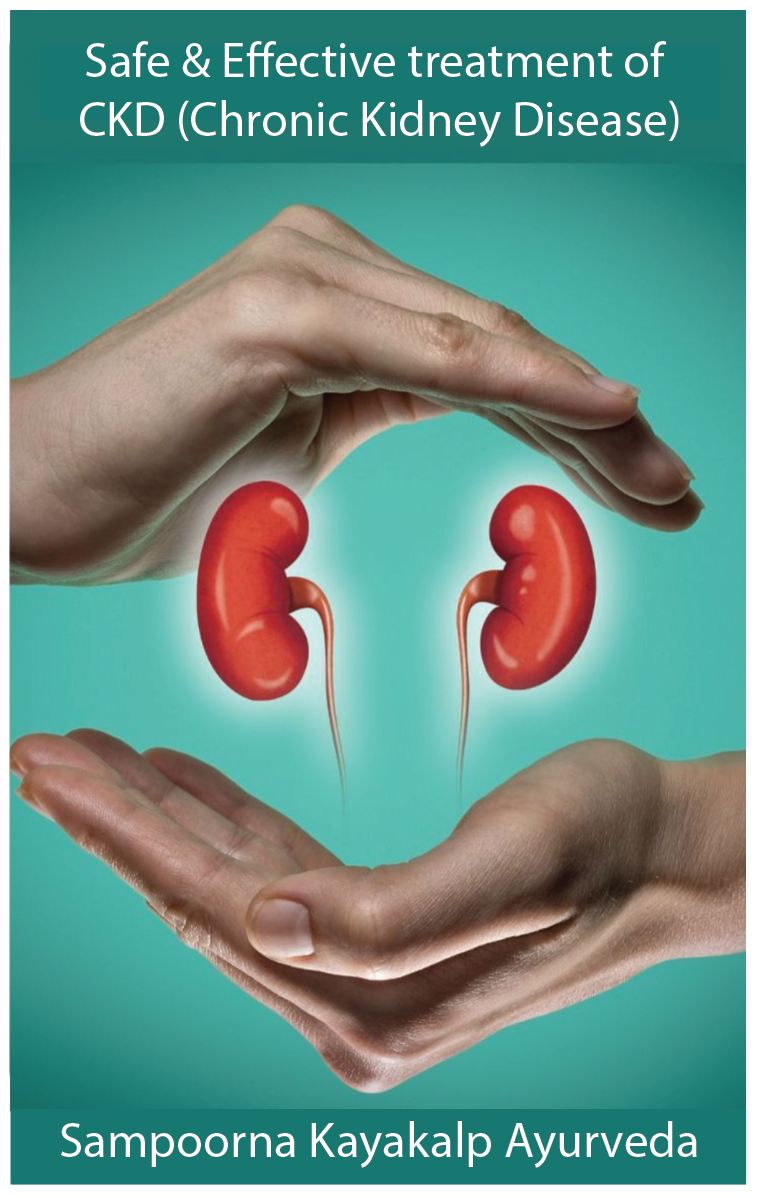Kidney Diseases-ckd

AYURVEDA & CHRONIC KIDNEY DISEASE (CKD)
By Dr SUNEET AURORA.
Ayurveda offers a holistic approach to managing Chronic Kidney Disease (CKD) by focusing on restoring kidney function, detoxification, and addressing underlying imbalances. It views CKD as a complication of urinary system disorders or systemic conditions like diabetes, and emphasizes the importance of a healthy diet, herbal remedies, lifestyle changes, and detoxification therapies like Panchakarma.
WHY KIDNEY GET DAMAGED:
Chief causes of Kidney Damage are:
Uncontrolled long standing Diabetes
Chronic kidney stones
Uncontrolled long standing Hypertension (Hi BP)
Allopathy pharma drugs, like NSAIDS (pain killers), antibiotics, sedatives, etc.
Lead and other industrial chemicals in ground water.
Although some pharma-corporate hospitals lobby leave no effort to cry foul and even blame Ayurveda for kidney diseases (sponsored yellow journalism in newspapers/ social media) but that is because modern medicine has not yet found any pharma medicine to cure, even to prevent kidney failures. We just sit and wait for Serum Creatinine to cross 7 to start dialysis and then run around to search for kidney donor for replacement. One kidney patient is worth a million to corporate hospitals; and we understand that one gets upset when one's business is lost to other result oriented safe herbal treatments systems.
On the other hand, many herbo-mineral preparations are available in Ayurvedic system of medicine for the treatment of chronic kidney disease . Ayurveda plays a master role in the fast and safe recovery of damaged kidney.
Here's a more detailed look at how Ayurveda addresses CKD:
Understanding CKD in Ayurveda:
Ayurveda considers CKD as an Upadrava, a complication of underlying urinary system disorders or systemic conditions. In Ayurveda, CKD is associated with disturbances in the ‘Mutravaha Srotas’, the srotas (channels) responsible for urine flow. All three Doshas (Vata, Pitta, and Kapha) can be involved, but Kapha is believed to play a significant role in blocking microvessels and developing microangiopathy, while Vata can lead to tissue degeneration.
Treatment Approaches:
Diet: Ayurveda recommends a plant-based diet with low protein intake, limiting foods high in potassium and phosphorus, such as bananas and dairy.
Lifestyle Changes: Regular exercise, stress reduction techniques (Yoga and meditation), and avoiding smoking and alcohol are emphasized.
Panchakarma: This detoxification therapy helps remove toxins and improve kidney function.
Ayurvedic Medications:
Herbs: Specific herbs like Punarnava, Gokshura, and Varuna, known for their diuretic properties, are used to manage symptoms like edema. These herbs act as Rasayana (Rasayana are used to protect and repair kidney tissue and enhance their quality.)
Ayurvedic recommens herbs like Ashwagandha and Amla to alleviate fatigue and improve energy levels.
Herbal Formulations:
Ayurvedic medications like Kayakalp CKD capsule/ kadha, Gokshuradi guggulu, and Punarnavadi madoor, believed to have nephroprotective and diuretic properties, are used.
Herbs like Apamarg, Gokshura, and Kasni are used to dry Ama (toxins) and clear Srotas (channels).
Key Principles in Ayurveda:
Ayurveda has Individualized Approach: Treatment plans are tailored to the patient's body type (Prakriti), and their specific symptoms.
Ayurveda has Holistic Approach: Ayurveda addresses the physical, mental, and emotional aspects of the disease.
Ayurveda is good for Preventing and Managing Complications: Ayurvedic interventions aim to prevent complications like dialysis and renal replacement therapy.
Ayurveda helps in Improving Quality of Life: Ayurveda focuses on improving the patient's overall well-being and quality of life.
Note:
Treatment kit for Kidney Diseases can be delivered to your doorstep after online consultation.
For online consultation,
Call 0161-5028269; Whatsapp +91 7589001373; e mail: [email protected]
